Welcome to Word of Mouth, where dentists talk about how oral health is related to overall health, which is also known as the oral systemic connection.
In season two, episode six of the integrative health podcast Word of Mouth, IAOMT member, Dr. Chris Edwards interviews Dr. Haley Freymiller on her experience of becoming a Biological Dentist.
Dr. Chris Edwards: Hi, I'm Dr Chris Edwards and I am sitting here with my new associate Dr. Haley Freymiller, actually not new, Haley has been with us almost a year. We're at the IAOMT conference and we're here to talk about Biological Dentistry, it's benefit to ourselves personally, to our patients and also to our practice.
So Haley, I wanted to ask you what it's been like for you. Why don't we start with a little bit of your history?
Dr. Haley Freymiller: I graduated from the University of Florida in 2014, and I'm from Florida. I'm a Florida native and have never seen snow. So, I wanted to kind of get out of Florida and see some seasons. I ended up at Ohio State University and did their general practice residency program. I was able to treat special needs patients and hospital patients and just fell in love with treating patients that are often overlooked by other dentists. I ended up staying there for an extra year for my chief residency year. During that year, the dean of the dental school asked me if I would be willing to go to Memorial Sloan Kettering and do a dental oncology fellowship and then return back to Ohio State University and open a dental oncology clinic there. That was kind of the path that I traveled on. I went back to Ohio State University and opened the clinic, and we were only open for about six months when I decided I couldn't take any more winters. So, I moved back home in 2018, and a couple of months later, I was invited to go to a study club with my dentist that I grew up going to, and you were there.
I knew you were looking for an associate, and I'd been told ahead of time that you were a holistic dentist. I was honestly not quite sure how I felt about it. I'd never been exposed to any of this world of dentistry or medicine or any of it, and so I was hesitant. But you were such a friendly person, and you invited me in and made me feel welcome, and I saw your office. You were not doing any "voodoo-y" procedures. You were doing the highest quality dentistry that I had ever seen, working with top-notch technology. So, it was just nothing like I was expecting it to be. Now that you're including me in this world and helping me further my career here with going to conferences and learning more about it, I've just been extremely surprised by how much literature there is supporting all of this. In mainstream dentistry, I feel like a lot of times my faculty members would kind of poo-poo this, as just saying like these people are kind of crazy. That was kind of my perception before this, and it has not, It's been the complete opposite.
Dr. Chris Edwards: It's interesting that you look at the scientific method, and we're trained in dentistry that we want to be evidence-based. Yeah, it was hammered home.
exactly we want the science and it's interesting in my own journey of Biological Dentistry which has you know been over 10 years I have become jaded to science when I have really you know when you really dig deeper you realize how much of the science is twisted and manipulated and so hum sort of skeptical somewhat of science but I really believe that Biological Dentistry is the truth and and this IAOMT is really based in science that's what I like about this organization is that they really are they want to be stand behind what they say and what they teach yeah I agree so tell us a little bit about the patients in Biological Dentistry that you know you have encountered in in our practice.
Dr. Haley Freymiller: So the patients have been have been patients that I've ever been able to interact with and it's actually almost sometimes easier to communicate with them because they've already done all of the homework they probably know what I'm going to recommend before I recommend it and so I feel like I'm less having to convince people that you need to take care of your mouth this is why it can impact your entire body and these people these patients are they've already convinced themselves of that and so they're there to get treatment done they are the most compliant patients that I've worked with they follow through with treatments that are recommended they do their home care they're just they're a wonderful group of patients and very open-minded and they've taught me so many things that I mean it's like a continuing education course every day with them I totally agree with you I can't tell you how much I have learned from my own patients and some of them are so smart yeah and you know and it becomes a back and forth a given a take with the patients and right you know and and working together synergistically to try and get to health right we're really a team yes and the patience so tell us a little bit about some of the technologies that that we use that are that you found interesting some of the biological Technologies yeah so ozone's the first one that kind of pops into my mind because when I first learned that you were doing that in the office I was just like um I feel like ozones I've only ever heard about it it's like the ozone layer of the Earth and and so I would I wasn't sure how that could apply to Dentistry what implications I can have in my everyday treatment and you were generous enough to take me out to an ozone conference pretty soon after I started with you and that was kind of when my mind started to make the change from okay Biological Dentistry isn't this realm full of weird people who believe strange things this is stuff that is well documented and studied and has been shown scientifically to have like good effects for us that we can use as treatments for our patients so using it when we're doing a cavity prep and we're getting close to the nerve we can ozonate the tooth to help decrease sensitivity using it after we do our extractions to kind of take all of the bacteria and kill as much of the bacteria as we can in the socket of the infected root canal tooth that we just took out so that would be one of the biggest technology things that I think we're using that most mainstream dentists don't because I think really they just don't know about it that's it so true is that you know you don't know what you don't know yeah and uh you know and you've been so open to learning you know I've seen that I've seen you flourish in you know in the these months and and this is now your first iaomt conference yes and tell me how you're feeling oh my mind's been bent it's crazy um before coming here I was still very unsure about how I felt about fluoride I know in in our office we don't really push it at all I work in another office that's more Insurance based it's a more traditional dental office and all the times the assistant all the time the assistants come to me and they're like well this patient's mom doesn't want fluoride and I'm just like whatever it doesn't matter like if they want fluoride great I'm I'll give it to them if not but after seeing some of the presentations here and seeing the the studies that the Ada quotes for fluoride safety and efficacy and it's just it blows my mind that there's not the science behind their claims that I've always been taught that there has there was so that I don't even know how how to put it into words how much that makes my mind think well what else sure have I been taught throughout this whole like 13 years of education in dentistry like that is false yeah it has so much more to learn that's that's the exciting thing about the iaomt is that every time you come to one of these conferences there's such a a wide range of you know presenters and topics and the camaraderie of the different people that are here is wonderful they're uh they're all on that same Journey as we are in not only fixing teeth but really helping patients get healthy right and some of the rewards that we get as biological dentists are just so heartwarming and and they really they make it worthwhile they do because Dentistry is not an easy profession what we do is challenging you know and and I agree with you that the biological patients are the ones that are the most appreciative and uh you know and I'm so happy that you have joined our staff and uh you know and uh and you're following this path yet I think that you're doing it in a in your own way where you know you're learning yeah you know that there is science behind this yeah I agree I feel like I'm doing my own research outside of our time together and come sure that what I'm is supported by my own research and so far it has been yeah so what would you say to other younger dentists or newer dentists as a you know a way to put their toe into the water or you know consider it have an open mind
doesn't mean that it's written in stone and is 100 truth I mean we were taught by humans and they were taught the same things and just because it was something that we learned in school doesn't make it true that we're constantly progressing and learning new things about Mercury about fluoride I mean it's it's a whole evolutionary process that we need to just stay up with the current research and I mean right now the current research is saying that some of the the things that we're doing can have detrimental effects on our patients health so if we just Embrace that and follow that road I think that that will kind of start to lead you down the path of of just what Dentistry can be and how we can help our patients in more ways than just filling cavities one of the things that's been most impact impactful for me is that I have really learned that I can influence my own health and and for myself my journey really started where when I moved to Florida which was about 17 years ago and established a new practice became involved in a sort of a holistic community and had a functional medicine doctor who I started going to with to as a patient and when I got tested for mercury I was at 99 wow you know and I was my eyes went wow but of course I came from the days when we didn't wear gloves yeah and we would mix the amalgam soft which was more Mercury squeezed The Squeeze cloths with little balls of mercury would would fall out onto the carpet and uh and sometimes in a big feeling we would shove it in with our finger I was like so uh and I placed Mercury fillings and I believe strongly and as a matter of fact I can think back to my practice in Hawaii where the one of the first patients that had his Mercury removed and had resins placed and they were all failing and I I was so Stern with him that you know that we had to put mercury back in his mouth and and I did the Mercury feelings that lasted yeah but we've seen Dentistry progress so much that you know that now we know that we have alternatives and and of course I cut it out of the mouth besides putting it in their mouth I cut it out of the mouth unhealthily right for 25 years and you know uh and so you know for my myself to find out that I was Mercury toxic knock on wood that I was not symptomatic you know because I think I have a strong Constitution and you know and that's thought of me on a journey of really learning about how do I treat myself how do I go ahead and and and start getting the Mercury out of my own body and and how do I now help my patients and how do I protect myself and that's where the iaomt I think really shines in that they really are about creating an environment in the office that is conducive to health and conducive to protecting us you know us the dentists us the team that work with us yeah as well as our patients yeah yeah so for me that's been impactful and uh and one thing that I wanted to say to you know to prospective members is that I think that the idea of becoming a biological dentist is
a unbelievable practice builder in that you know as as we have evolved in Biological Dentistry over the years and and actually I went ahead and in my journey to learn more you know took uh Malik and Harris's naturopathic course so I'm actually a naturopath uh doctor of naturopathy at this point and I learned so much in that course which you know you got a little sense of yesterday when uh Phil talked about you know the cell membrane and the Matrix right and the space between the cells and and I tend to think that the biological practice is the answer to FIFA service because these patients are the ones who want to get healthy yeah and they're the ones that realize that their insurance is not going to pay for it all right and they're happy when it pays for some of it yeah and they're the ones that are searching us out that we are getting patients who are calling us because we are a biological practice and patients that are driving literally hours and and I would recommend to anyone who is interested in becoming a biological dentist that you are going to get the benefit of having a practice that will be will will grow Itself by the patients will come to find you right and they'll be they'll stay loyal also because I think there's dental offices popping up on every corner what makes you use a biologic office that has similar views as the patients and you're not calling these patients crazy when they come in the door saying they have a sensitivity to composite or bonding agent or whatever it may be and so I feel like these patients feel accepted in our offices amen amen and so many times they feel you know disrespected in so many other places yeah I've heard that several times and I've only been at it a year right and you know and I've I found that a lot of these patients have become my friends because we're sort of in the same you know Camp of health of looking at you know what is important to be able to you know to do in our own lives you know as far as taking care of our mouth and and our whole bodies and I think that as time has gone on we've only realized how much more important oral health is yeah to systemic health and I think that that word is is gotten out there to the public you know the fact that people are recognizing it finally yeah so uh well I'm so happy that you have you know joined our staff and and and you know and I I tend to think that it was encouraging to have the young Dental students here today and we sat at lunch yesterday with young Dental students and they were paying attention yeah and you know and I think there was a group of almost 30 of them that were at the lectures today and I think it's a great thing I think we as a Prof as a biological organization really need to get the word out and to get the younger dentists to uh to join and uh and and I I see you as being a leader in this and you know and that you know you're uh you know you're young and just starting the career and already seeing the benefits right and I think it's interesting for you in that you work not only at our practice but you work at a conventional practice which is you know sort of a private practice yeah and it's not a corporate Dentistry not a corporate it's a very nice office and you know and uh you know and they're an insurance driven office so you know I I feel I feel for the insurance driven dentist because they're being squeezed they're being squeezed on on two ends they're being squeezed by the insurance company which is cutting their fees and and dick rotating the treatment that they they can do and they're being squeezed on the other end by the corporate dentistry and in our area we've had in the last three years so much corporate Dentistry has come in because we're in a growing area of Florida that's you know the Space Coast that has a lot of you know new businesses have come in and you know we're booming and you know so the corporate Dentistry is saying hey this is where we need to come because these people all have insurance right and they put on a good show so I feel for the private the regular Private Practice dentist and you know they're they're on the hamster wheel as Dr Frank Speer would say so uh you know the biological practice tell us about the time that you get to be able to spend with a patient I think that's one of the things that we talked about on the plane up here yeah it's one of my favorite Parts is I get to actually sit down and talk to my patients and get to know them get to know their priorities and kind of what's driving them to seek dental care right now whether it's to get healthy or I mean there's so many reasons patients come in and so I can actually sit and identify those reasons and form a personal relationship with them aside from just coming in there having them open their mouth let me take a quick look around because I've got two other patients in the other room waiting for me and three hygienists that need a check so it's a lot less stress on me I feel like I can give the patients my undivided attention it's one-on-one time and I can just be more thorough with my treatment planning and think things through and it's it's just a lot less rushed I feel like patients get better treatment just because I have the time to do the better treatment absolutely it's all about diagnosis because if we don't have the time to diagnose not only the condition in the mouth but the diagnose what the patient really presents with and what their hopes their dreams their fears are yeah so uh you know so I I know that that's something that makes the end of the day when we go home that we really can feel like we've made a difference in people's lives I agree and I think patients also appreciate that we're not just focused on their mouth we're looking at how their mouth is also playing a role with the rest of their body and they were talking yesterday about asking patients about how they're sleeping and about bowel movements and I'm like these are things I don't think I would ever really ask but it makes sense because I mean we we know that the mouth is connected to the body and if you're having disturbances in other areas of the body the mouth can be playing a role in that and so we're not just treating the mouth even though that's where we're physically treating but it can have consequences good and bad throughout the rest of your body absolutely patients like that overall approach and I think that's the right approach sure and having them understand the relationship of the microbiome which is sort of the new buzzword and the effect that that microbiome can have on disease and health and the fact that that microbiome in the mouth is part of the master microbiome of the gut that goes through Us and how important that gut is in our overall health and how important that gut is in our oral health the communication between the two is huge huge really good tool that we use in our practice the live pluses we show patience on the microscope that there actually are little bacteria that are swimming around in their mouth and we we show them physically because everyone has heard as you said like it's the new buzzword everyone knows about the microbiome but to physically see it and see it come out of your mouth is very powerful I think for patients absolutely it's to this day it continues to amaze me every time I look at a slide and see bacteria darting across the stream and spirochets moving and you know single-celled organisms and yeah it's like wow yeah it's a great motivator for patients it is a great motivator and it's educational too you know and uh so and it is that's the microbiome that you know in a way sort of is controlling us yeah so uh you know and if we can make that we used to think that bacteria was so heinous and we had to kill all the bacteria and we've really come to learn that we need to nurture yeah the good bacteria in the microbiome we got to groom it right and uh and make it so that it Health becomes natural as a result of that right so Haley let's talk a little bit about Mercury yes that's one of those things that you were trained in Dental School was the standard of care yeah especially for special needs patients um a lot of times you can't get great isolation so Mercury was the restoration of choice never heard anything about taking any special precautions when removing Mercury so when I came to your practice and I saw you guys wearing masks and draping patients and vacuums and suctions it just the image that kept coming to my mind was that scene in E.T where there's Spacemen and just like white suits coming and everything's contaminated and I was just like this is over the top like what the heck the first time I wore a mask with the patient and had everything all set up I felt kind of silly and I was like I don't know if I can do this but then as you kind of led me down this path more I learned the reasonings and the rationale behind it and started seeing some of the literature about just what Mercury like it's not as innocuous as I've been and taught that it was and so now when I met my other my more traditional office and I have to remove a Mercury restoration I'm like holding my breath as I'm doing it and trying to not breathe it not to get too close because I I really appreciate now all of the precautions that we're taking I feel like it's better for me for the assistance for the patients for the earth I mean we're taking measures to make sure that this isn't going into our environment and we live by the Indian and banana rivers and it's a huge issue right now with contamination so I think just taking these in their very simple steps to take like it's not it's not anything that now now that I know I don't feel like it's anything that's over the top it's all very simple and has huge benefits for our health for the Earth and I just don't know why this isn't taught it's amazing how well the patients accept it too aren't they yeah you would think at first like you're wearing these respirator and you like you're like a bug yeah and that that they would be like freaking out but they understand they get it they do and I try to kind of go through with patients what's going to happen before we get to that point so that there isn't any fear or apprehension or like what the heck is this so patients I think are prepared for it and we explain the rationale of why we're doing this and they really appreciate it and how many patients are coming because they want safe Mercury removal so many so many that's that's one of those practice buildings Again by learning these skills you will have the patients will be hunting you down yeah and patients are they were asking me questions they were like do you use are you using latex rubber dams or nitrile and I was like like I don't know does it matter it's a rubber Dam and yeah it matters it does matter these patients are very well educated and so I feel like I need to know my stuff because I don't want patients to know my stuff better than I do so it's it's been a good kind of motivator for me to learn more and the more I learn the more I want to learn because it's just changing everything that I've learned in dental school right and being a biological dentist doesn't take away what we've learned at dental school you know any more ability to help patients with restoring their teeth then yeah we're doing Dentistry we're still doing Dentistry it's not it's not like we're applying weird salves on patients teeth and filling them with weird composites that are just nobody else has ever heard of I mean we're doing top-notch dentistry still with materials that other dentists would be envious to use because it's all the top brands that we're using I mean we're not doing weird stuff we're just kind of taking what's already been there applying the most current research to do it as safely and effectively as possible doing at least harm to our patients and ourselves and protecting ourselves.
Dr. Chris Edwards: Well, Haley thank you so much for sharing your journey of becoming a biological dentist.
Dr. Haley Freymiller: I have a great mentor.
Dr. Chris Edwards:I appreciate it well thank you you know what it's it's uh it's my pleasure to help teach you just like we're teaching our patients because I think that's part of it is that we're all in this together yeah you know and uh you know and we're we're serving our patients you know and uh that's you know what a blessing I look at it every day as a blessing in my life that I can actually help and serve others yeah you know and and through that we're serving higher power you know and uh so uh that's fantastic well thank you so much for your time and and learning about the IAOMT and and being on the word of mouth podcast and for our listeners and viewers to learn more you can go to wordofmouth.iaomt.org to view this and other great podcast that the IAOMT has produced .
This podcast has been brought to you by the International Academy of Oral Medicine and Toxicology, the IAOMT, The IAOMT strives for safer dentistry and a healthier world. We are a network of over 1,000 dentists health professionals and scientists who research dental products and practices, including the risks of mercury fillings, fluoride, root canals, and jawbone osteonecrosis. We are a non-profit organization and have been dedicated to our mission of protecting public health and the environment since we were founded in 1984.
You can learn more about us at www.iaomt.org and www.thesmartchoice.com
The information provided in this video is not intended as medical advice and should not be interpreted as such if you seek medical advice please consult with the healthcare professional also the information in this video represents the the thoughts of the individual speakers and the views expressed in this interview do not necessarily reflect the views of the IAOMT.

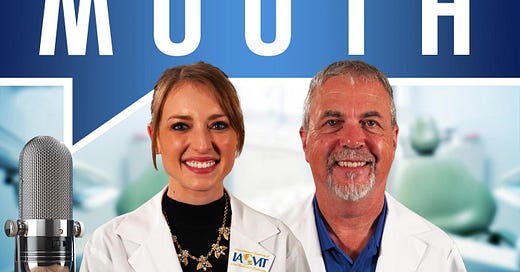
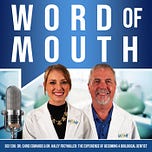



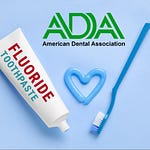

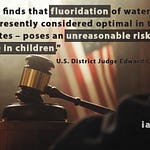
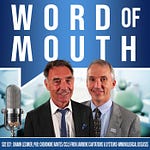
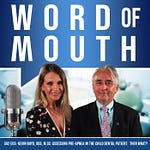

Share this post